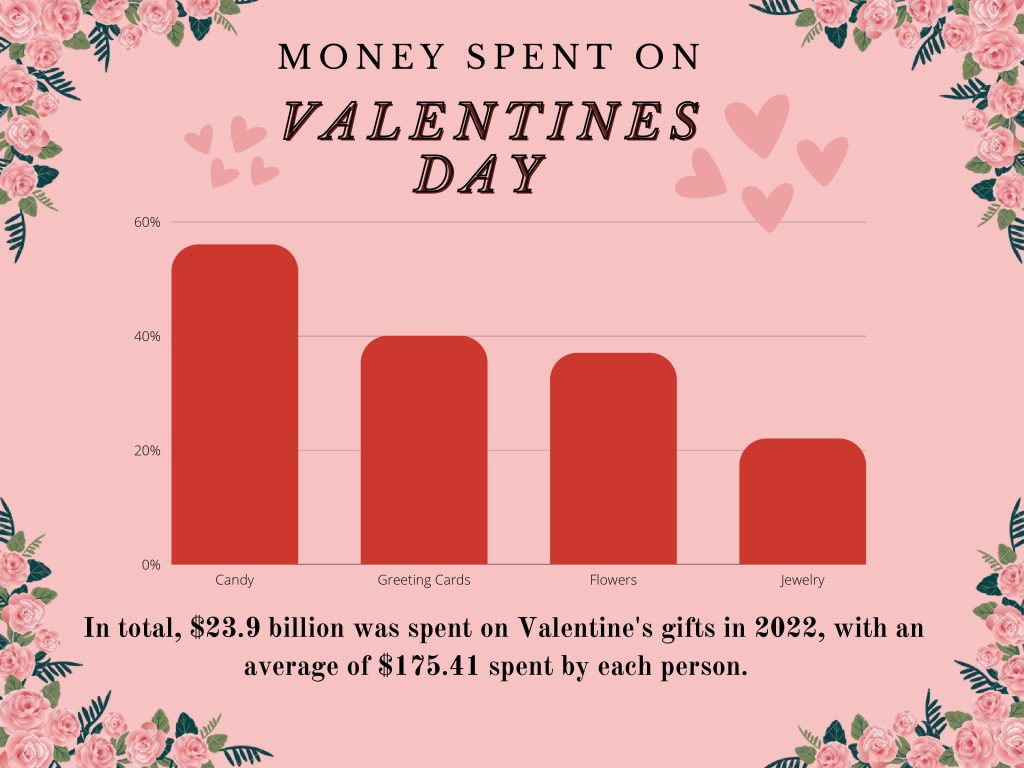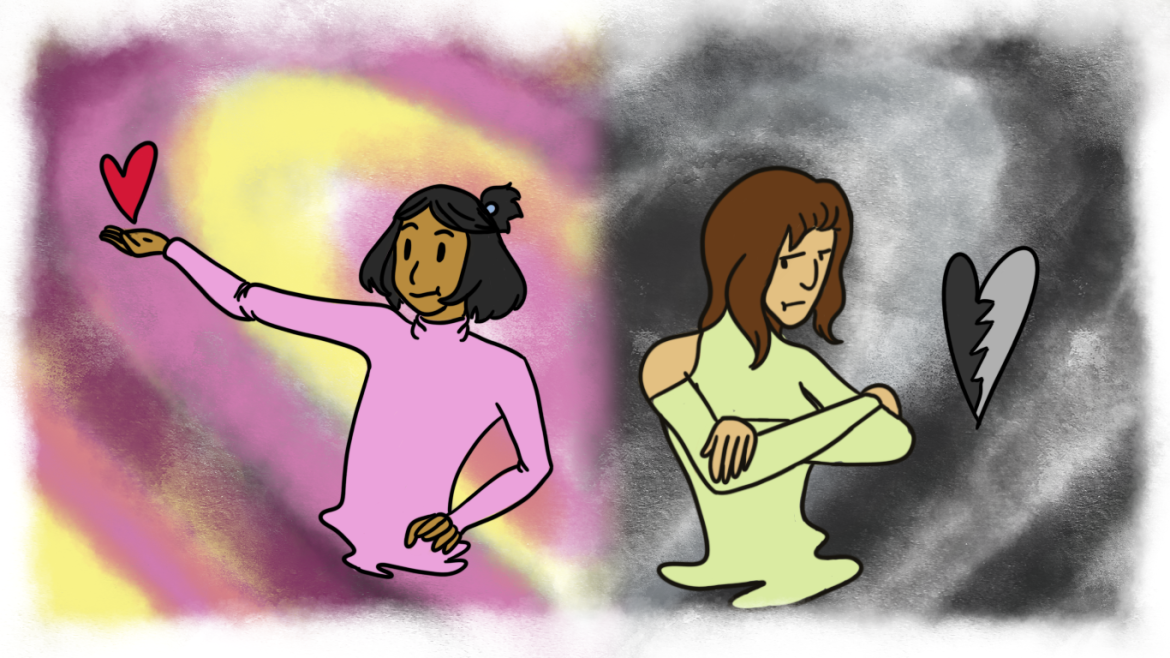An illustration depicts Webmaster Maya Shrivastav (left) enjoying Valentine’s Day, while Viewpoints Staffer Isabelle Galis (right) dislikes it. Shrivastav and Galis debated the pros and cons of the holiday. “Valentine’s Day isn’t only meant for people who are in traditional romantic relationships,” Shrivastav wrote. “Anyone can celebrate, exchange candy and gifts and enjoy a fun time on Feb. 14, regardless of whether they’re doing it with a significant other or with a group of friends.” Illustration by Antonio Starks
Viewpoints Staffer Isabelle Galis and Webmaster Maya Shrivastav debate the pros and cons of Valentine’s Day.
Pro Valentine’s Day: Webmaster Maya Shrivastav
Imagine this: one is in a romantic relationship, and on Valentine’s Day, their endearing partner walks to them with flowers and a box of chocolates. Around them, friends are exchanging gifts with one another as well. The feeling of love is in the air.
Exchanging gifts on Feb. 14 isn’t meant to be stressful or forced. Valentine’s Day is a time to celebrate the relationships one has and to express one’s love of those who are important to them.
To some, the flowers, cards and candy might seem to force commercialized and materialistic ideas, but the purpose of the holiday is to appreciate loved ones through those gifts. It’s one day in the year for people to emphasize that affection in a celebration of relationships.
Additionally, Valentine’s Day isn’t only meant for people who are in traditional romantic relationships. Anyone can celebrate, exchange gifts and enjoy a fun time on Feb. 14, regardless of whether they’re doing it with a significant other or with a group of friends.
Exchanging gifts on Feb. 14 isn’t meant to be stressful or forced. Valentine’s Day is a time to celebrate the relationships one has and to express one’s love of those who are important to them.
But Valentine’s Day has often gained controversy for its commercialization.
According to a survey conducted by the National Retail Federation, consumers in the U.S. are expected to spend over $25 billion on buying their partners cards, candy and more for Valentine’s Day, and the high costs can make displays of affection seem material and fake.
However, Valentine’s Day celebrations and gifts don’t mean that love can’t be celebrated any time throughout the year, or that relationships should be built around material objects. The holiday is a fun time to celebrate love, whether that means romance or simply friendship, with gift-giving traditions.
Valentine’s Day isn’t fake or obligatory. It doesn’t promote materialistic relationships or force people to only show affection on one day of the year. It is a holiday that can be fun to celebrate for anyone: any age, any person and any relationship.
Against Valentine’s Day: Viewpoints Staffer Isabelle Galis
Picture this: tomorrow is Valentine’s Day. Everyone with a significant other is running to the store to buy classic red roses and a chocolate box. The expectation to show affection and the fear of falling short as a partner is intense.
Doesn’t it seem so commercial? Love should be natural, not forced. The flowers, chocolate and big fat teddy bears might be nice, but it’s become an obligation.
It is a sweet thing to give loved ones gifts, but the flowers and candy seem so impersonal. Though one could argue it’s classic or traditional, it still has an artificial feel to it.
A healthy relationship shouldn’t be based on these materialistic things, and Valentine’s Day encourages this way of thinking. This creates an unhealthy standard of what a relationship should be.
Valentine’s Day manages to make showing love to your significant other a chore, while also shaming people who don’t have a special someone to spend it with.
Not only does Valentine’s Day put pressure on people in relationships to show commercial affection, it also pressures people who don’t have a significant other. Valentine’s Day overlooks friendly and familial affection, leaving those without a significant other excluded from celebrating. If it’s a day for love, why does it leave people out?

A graphic shows the amount of money Americans spent on Valentine’s Day in 2022. According to Viewpoints Staffer Isabelle Galis, commercialism makes Valentine’s Day pressuring. “A healthy relationship shouldn’t be based on materialistic things, and Valentine’s Day encourages this way of thinking,” Galis said. “This creates an unhealthy standard of what a relationship should be.” Graphic by Isabelle Galis
An article published by American Association of Retired Persons in February of 2018 states that “48% of U.S. adults have worried about a friend or family member feeling lonely on (Valentine’s Day).”
Although it is a day for showing love, it’s dominated by romantic couples.
For a holiday that some would say is inclusive and easy to be celebrated by everyone, it seems as though it’s not so inclusive after all.
Valentine’s Day manages to make showing love to your significant other a chore, while also shaming people who don’t have a special someone to spend it with.
What could be worse?
More from Maya Shrivastav
More from Isabelle Galis
